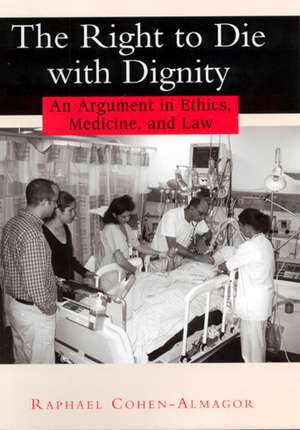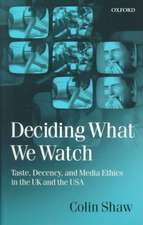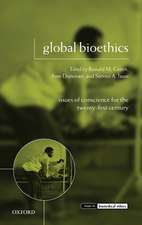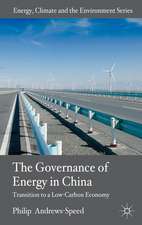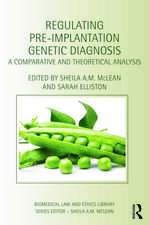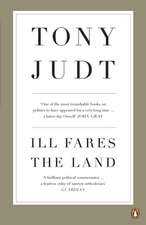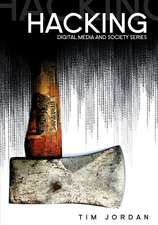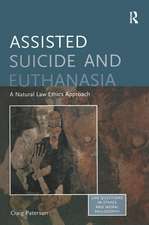The Right to Die with Dignity: An Argument in Ethics, Medicine, and Law
Autor Raphael Cohen-Almagoren Limba Engleză Hardback – noi 2001
There are few issues more divisive than what has become known as “the right to die.” One camp upholds “death with dignity,” regarding the terminally ill as autonomous beings capable of forming their own judgment on the timing and process of dying. The other camp advocates “sanctity of life,” regarding life as intrinsically valuable, and that should be sustained as long as possible. Is there a right answer?
Raphael Cohen-Almagor takes a balanced approach in analyzing this emotionally charged debate, viewing the dispute from public policy and international perspectives. He offers an interdisciplinary, compelling study in medicine, law, religion, and ethics. It is a comprehensive look at the troubling question of whether physician-assisted suicide should be allowed. Cohen-Almagor delineates a distinction between active and passive euthanasia and discusses legal measures that have been invoked in the United States and abroad. He outlines reasons non-blood relatives should be given a role in deciding a patient’s last wishes. As he examines euthanasia policies in the Netherlands and the 1994 Oregon Death with Dignity Act, the author suggests amendments and finally makes a circumscribed plea for voluntary physician-assisted suicide.
Raphael Cohen-Almagor takes a balanced approach in analyzing this emotionally charged debate, viewing the dispute from public policy and international perspectives. He offers an interdisciplinary, compelling study in medicine, law, religion, and ethics. It is a comprehensive look at the troubling question of whether physician-assisted suicide should be allowed. Cohen-Almagor delineates a distinction between active and passive euthanasia and discusses legal measures that have been invoked in the United States and abroad. He outlines reasons non-blood relatives should be given a role in deciding a patient’s last wishes. As he examines euthanasia policies in the Netherlands and the 1994 Oregon Death with Dignity Act, the author suggests amendments and finally makes a circumscribed plea for voluntary physician-assisted suicide.
Preț: 353.62 lei
Nou
Puncte Express: 530
Preț estimativ în valută:
67.67€ • 72.36$ • 56.42£
67.67€ • 72.36$ • 56.42£
Carte tipărită la comandă
Livrare economică 17 aprilie-01 mai
Preluare comenzi: 021 569.72.76
Specificații
ISBN-13: 9780813529868
ISBN-10: 0813529867
Pagini: 320
Dimensiuni: 152 x 229 x 25 mm
Greutate: 0.45 kg
Ediția:None
Editura: Rutgers University Press
Colecția Rutgers University Press
ISBN-10: 0813529867
Pagini: 320
Dimensiuni: 152 x 229 x 25 mm
Greutate: 0.45 kg
Ediția:None
Editura: Rutgers University Press
Colecția Rutgers University Press
Notă biografică
Raphael Cohen-Almagor has been the Fulbright-Yitzhak Rabin Scholar and a visiting professor at UCLA School of Law and department of communication. He is chairperson of library and information studies at the University of Haifa, and the author of The Boundaries of Liberty and Tolerance, Speech, Media and Ethics: The Limits of Free Expression, and Euthanasia in the Netherlands.
Cuprins
1. Language and Reality at the End of Life
2. Post-Coma Unawareness Patients
3. Sanctity and Quality of Life in Medical Ethics
4. Passive and Active Euthanasia
5. What Interests Do We Have?
6. The Role of the Patients' Loved Ones
7. An Outsider's View of Dutch Euthanasia Policy and Practice
8. The Oregon Death with Dignity Act
Conclusions: A Circumscribed Plea for Voluntary Physician-Assisted Suicide
App. Ethical, and Financial Considerations in Allocating Health Care Resources
2. Post-Coma Unawareness Patients
3. Sanctity and Quality of Life in Medical Ethics
4. Passive and Active Euthanasia
5. What Interests Do We Have?
6. The Role of the Patients' Loved Ones
7. An Outsider's View of Dutch Euthanasia Policy and Practice
8. The Oregon Death with Dignity Act
Conclusions: A Circumscribed Plea for Voluntary Physician-Assisted Suicide
App. Ethical, and Financial Considerations in Allocating Health Care Resources
Recenzii
The author attempts a balanced approach to the right to die debate, viewing the dispute from public policy and international perspectives. He offers an interdisciplinary approach, including medicine, law, religion, and ethics. With a comprehensive look at the troubling question of whether physician-assisted suicide should be allowed, he delineates a distinction between active and passive euthanasia and discusses legal measures that have been involved in the United States and abroad.
Cohen-Almagor uses insightful examples and applies his penetrating intellect to shed light upon some of the most difficult choices that arise at the end of life.
A nuanced discussion of some of the most difficult issues in health, law, and bioethics today, written in a lively prose and with a clear sense of moral passion. The international perspective is particularly useful and, undoubtedly, Cohen-AlmagorÆs arguments and conclusions will provoke discussion.
Descriere
There are few issues more divisive than what has become known as “the right to die.” One camp upholds “death with dignity,” regarding the terminally ill as autonomous beings capable of forming their own judgment on the timing and process of dying. The other camp advocates “sanctity of life,” regarding life as intrinsically valuable, and that should be sustained as long as possible. Is there a right answer? Raphael Cohen-Almagor takes a balanced approach in analyzing this emotionally charged debate, viewing the dispute from public policy and international perspectives.
